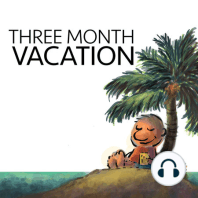21 min listen

How To Use The "Problem" To Get Attention (Without Being Negative)
How To Use The "Problem" To Get Attention (Without Being Negative)
ratings:
Length:
21 minutes
Released:
Mar 20, 2015
Format:
Podcast episode
Description
Most of us use benefits or solutions when presenting our products or services?and not the problem. So why bother with the problem? Will it actually improve the conversion on our sales pages? Will it improve our e-mail marketing? Will it get more attention when we're making our presentations? The answer is yes, yes and yes. And you can do it without being negative in any way. So how do you do it? Let's find out in this episode. / -------------------- Useful Resources Email me at: sean@psychotactics.com Magic? Yes, magic: http://www.psychotactics.com/magic Finish The Book Workshop: http://www.psychotactics.com/dc Meet Me In Denver: http://www.psychotactics.com/denver For the Headline Report (Free): http://www.psychotactics.com/ -------------------- Time Stamps 00:00:20 Introduction: Getting Attention with the Problem 00:01:36 Previous "Attention" Episode 00:02:30 Table of Contents / 00:02:53 Part 1: Underestanding Solutions 00:05:29 Part 2: Creating the Problem 00:10:47 Part 3: Sticking to the Problem 00:14:07 Summary 00:16:07 Action Plan: The ONE thing 00:17:13 Brain Audit Kit + Info-products Workshop + iTunes Review ------- Sean: Have you ever been in the situation where you've been in the shower, it's nice warm water, and then suddenly it's freezing cold? That's because someone else turned on a tap somewhere else in the same apartment. No? That hasn't happened to you? How about a computer? Have you had a computer that went vroom, vroom, vroom, ready to start and it started to go slow and slow and then boom? These are problems and problems get attention. The problem is that we don't make use of the problems when we're getting our message across and we certainly don't use it the way it should be. How should the problem be used and why not use the solution instead? That's today's episode on attention getting. On the last episode of attention getting, we talked about how you can use the two concepts of novelty and consequences, but here's another way, using the problem. What are we going to cover today? You like the three things, don't you? We'll cover three things, then we'll do the one thing that you can do and then we'll wrap up. Just in case you haven't heard Episode No. 24, well, listen to it again. I had to do it twice. The first time I did it, I was half asleep and then I had to re-edit the whole thing all over again because the first one really put me asleep. Imagine that? The irony. It was about attention getting and the voice was so slow. If you got that episode or you thought this is really slow, well, there's a new episode. Delete the old one, download the new one again and you'll find that it's much better, much better music, much better tone, and yes, I'm awake in that one. That was Episode No. 24 on how to get attention through novelty and consequences, use the problem. We're going to cover three things in this episode. The first thing is why solutions are less effective than problems, and second is why problems get your attention. The third is the mistake that most of us make with implementing the problem. Let's start with the first one which is why solutions don't work as well as problems. To understand solutions, you have to understand your day-to-day life and your day-to-day life is simply a whole bunch of solutions. When you sit on the chair, that's a solution. When you switch on your computer and it works perfectly, that's a solution. When you get in you car and you turn on the ignition, that is a solution. What is the problem? The problem is the opposite of the solution. Let's take those instances and you know where I'm going with this. You sit on the chair, it breaks. You turn on the car ignition, it won't start. That's where your brain gets activated. You don't think of your cha
Released:
Mar 20, 2015
Format:
Podcast episode
Titles in the series (100)
Why We Sell Less: The Root of Confidence: The hardest thing in business?or life is the factor of confidence. Whether you're in online marketing, selling products or services, or run a physical store, the confidence goes up and down. And yet, confidence is what creates sales. Sales, after all,... by The Three Month Vacation Podcast